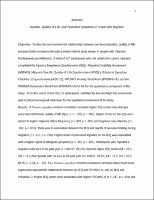Please use this identifier to cite or link to this item:
https://hdl.handle.net/20.500.12202/6627| Title: | Injustice, quality of life, and psychiatric symptoms in people with migraine. |
| Authors: | Seng, Elizabeth K. Foley, Frederick Hirky, Anne Elizabeth Parker, Amanda |
| Keywords: | clinical psychology Clinical Health Psychology Migraine Neurology Perceived Injustice Quality of Life |
| Issue Date: | Dec-2020 |
| Citation: | Parker, A. (2020, December). (Publication No. 28318081). Injustice, quality of life, and psychiatric symptoms in people with migraine. [Doctoral dissertation, Yeshiva University]. PQDT |
| Abstract: | Objective: To describe and examine the relationships between perceived injustice, quality of life and psychiatric symptoms through a mixed method study design in people with migraine. Participants and Methods: A total of 127 participants who met criteria for current migraine completed the Injustice Experience Questionnaire (IEQ), Migraine Disability Assessment (MIDAS), Migraine Specific Quality of Life Questionnaire (MSQL), Allodynia Symptom Checklist-12 questionnaire (ASC-12), PROMIS Anxiety Short-Form (PROMIS-A), and the PROMIS Depression Short-Form (PROMIS-D) for the for the quantitative component of the study. From the scores of the IEQ, 10 participants, stratified by low and high IEQ scores took part in phenomenological interviews for the qualitative component of the study. Results: A Person’s product-moment correlation revealed higher IEQ scores were strongly associated with lower quality of life (QoL; r = -. 676, p < .001). Higher scores on the IEQ were related to higher migraine attack frequency (r =.403, p < .001) and migraine pain intensity (r = .352, p < .001). There was no association between the IEQ and reports of nausea/vomiting during migraine (r = .110, p = .220). Higher levels of perceived injustice on the IEQ were associated with a higher report of allodynia symptoms (r = .281, p < .001). Participants who reported a migraine with aura in the past year (n = 84/127, 66.1%) reported higher IEQ scores (M = 23.4, SD = 11.4) than people with no aura in the past year (n= 43/127, 33.9%; M = 18.6, SD = 10.2; t(125) = -2.34, p = .02). Two Pearson’s product-moment correlations and two hierarchical linear regressions assessed the relationship between (a) IEQ and PROMIS-A, and (b) IEQ and PROMIS-D. Higher IEQ scores were associated with higher PROMIS-A (r = .447, p < .001) and PROMIS-D scores (r = .495, p < .001). The IEQ was able to statistically significantly predict an additional 21.2% of the variance in PROMIS-A scores F(1, 122) = 16.43, p < .001, adjusted R2 = .186, (beta) = .387, p < .001. Finally, the IEQ was able to statistically significantly predict an additional 25.1% of the variance in PROMIS-D scores F(1, 122) = 23.19, p < .001, adjusted R2 = .226, (beta) = .448, p < .001. For the qualitative results, the phenomenological interviews resulted in a set of 4 core themes describing perceived injustice and QoL with migraine: coping, loss, illness burden, and misunderstood. All of the study participants (N=10) endorsed these themes in some capacity regardless of belonging to the high or low IEQ group. Conclusion: Higher levels of perceived injustice showed lower levels of QoL, was associated with higher headache frequency and headache attack severity, and higher rates of depressive and anxiety symptoms. People who experience migraine described their quality of life similarly, regardless of whether they reported high or low levels of perceived injustice. This knowledge could provide beneficial information to specifically target psychological treatment and prepare a multidisciplinary team for the consequences of how patients with migraine are affected. Specifically, this study provided information about psychosocial factors that contribute to poor QoL in people with migraine and provide guidance for behavioral treatment development. |
| Description: | Doctoral dissertation, Ph.D., Ferkauf Graduate School of Psychology, 2 year embargo. |
| URI: | https://hdl.handle.net/20.500.12202/6627 https://ezproxy.yu.edu/login?url=https://www.proquest.com/dissertations-theses/injustice-quality-life-psychiatric-symptoms/docview/2525691100/se-2?accountid=15178 |
| Appears in Collections: | Ferkauf Graduate School of Psychology: Doctoral Dissertations |
Files in This Item:
| File | Description | Size | Format | |
|---|---|---|---|---|
| Amanda Parker Injustice Quality OA Dec2020 Ferkauf.pdf | 711.51 kB | Adobe PDF |  View/Open |
This item is licensed under a Creative Commons License

